
31 minute read
Contracts
Deep clean for nursery signals start of partnership
A disinfection and sterilisation system used in sectors such as healthcare and food production is being launched on a wider scale by a new business partnership, creating an initial 25 jobs.
Sutton Coldfield-based Nexus has teamed up with BioDecon, based in York, offering deep cleaning and sterilisation throughout the UK, utilising their mobile teams ready for when office staff currently working from home return to their regular routine, as well as attending workplaces staffed by essential workers who have to remain at their posts during the crisis.
The effects of this deep clean, using patented technology, include complete inactivation of MERS and SARS-like viruses including the COVID-19.
Nexus is owned by Willenhall-based Fortel, who chose its neighbour, nursery Tiny Talents, as the first to receive a complimentary deep clean in a bid to assist staff and key workers
Comets over Ipswich
IPSWICH Borough Council’s housing division has taken delivery of the first three of a proposed 10-strong procurement of Prochem Comet walk-behind cleaning extractors.
The machines, supplied by Ajax Domestic Spares to the council’s maintenance and contracts department, are being used to clean 15 sheltered housing schemes located across the town.
The schemes, constituting mostly flats in blocks, each have an appointed cleaner or cleaning contractor who maintains communal
From left, technician Harry McMillan, with Jot Engelbrecht (Nexus) and Andy McMillan (BioDecon).
whose children are being looked after at the site. This is one of many free-of-charge deep cleans being arranged to maximise training opportunities and as part of the company’s commitment towards improving social value within the community.
New staff recruitment is underway, with training being given in deep cleaning techniques. The cleaning is then carried out using patented TOMI | SteraMist technology
areas and an 18 person caretaking team that carries out routine maintenance, decorating and specialised cleaning.
“The Comets are replacing another range of machines that have reached the end of their useful working lives and are proving ideal to task for our caretaking team,” said council stores manager, James Tonner. “We’ve been using Prochem solutions for over 20 years and switching to the company’s technology has motivated us to convert fully now to the brand.” WWW.PROCHEM.CO.UK
(formally known as the European Safety Bureau) - who will audit venues to the new COVID Controlled Certification scheme. etc.venues ‘A breath of fresh care’ initiative, will apply Cleanology’s scientific approach to cleaning practices that build upon the current high standards where hospital grade products are already in use. The initiative, believed to be the first of its kind for UK venues, demonstrates a focus on cleanliness that will reassure both event planners and delegates throughout the etc.venues portfolio. etc.venues director of operations, Guy Booth, said: “As a leading venue brand, we felt it important to set a new standard and to respond to the need for enhanced health and safety requirements. As we get back to business and reopen our venues, our clients, team members and suppliers need to be confident that our venues offer the highest standards of safety.”

AS part of its comprehensive preparations and new operating procedures for the reopening of venues, etc.venues has developed a new programme to deliver cleanliness and disinfection in its venues. The company will collaborate with Cleanology and with Navitas

created by Beverly Hills company TOMI. The unique approach means that offices and other workplaces can be deep cleaned and sterilised without any equipment being damaged, with no need for a wipe down afterward as no residue is left.
Jot Engelbrecht, managing director at Nexus, said: “The highest level of sterilisation and decontamination is clearly going to be at the forefront of business leader’s thinking going forward. We are proud to be launching this service with a number of selected complimentary deep cleans to organisations that contribute to their community and are close to our heart. On a wider scale, staff are going to want to feel safe when they return to work and this is one contribution in achieving that. The quick turnaround and lack of intrusion will be key factors for a lot of companies.” WWW.GONEXUS.CO.UK
Cleanology’s CEO, Dominic Ponniah, said: “COVID-19 brings significant new challenges to the cleaning of venues, but with our 15 years’ experience of working with etc.venues we will be bringing in elevated processes and enhanced team training and PPE to help delegates enjoy an even cleaner and safer visit. By using the most effective products and technology on the market, we are able to ensure that etc.venues is maintained to the highest possible standards of hygiene and cleanliness.” WWW.CLEANOLOGY.COM
99% of the time it will kill 99% of ‘known’ germs
THERE is a brand of bleach that claims to kill 99% of all known germs (what about the other 1%?). There is, of course, a difference between germs, bacteria, viruses and funguses.
The first time I became aware that I needed to use a handkerchief is after I sneezed as a child and my mother said I was ‘spreading my germs everywhere’. We all now know that sneezing is one way to swiftly spread diseases.
‘Coughs and sneezes spread diseases’ is a phrase that is believed to have been thought up by the Americans between 1918-1920 during an influenza pandemic, and it reappeared again in 1946 when the NHS used it in an advertorial campaign. Perhaps some of us are more used to seeing the ‘Catch it, Kill it, Bin it’ slogan that was launched when H1N1 (Swine Flu) appeared in the mid-2000s.
Germ is a generic term that is currently used to describe bacteria viruses, and is a catchall for a specific subgroup - so what are germs?
The word ‘germen’ is an incorporative phrase to describe any microscopic particle that can

cause illness in humans. The word ‘germ’ comes from the Latin word ‘germen’, meaning seed or sprout, because early scientists studying germs thought of them as little seeds. It is also believed that the spread of organisms from person to person dates back to ancient Greece.
Before the germ theory became widely accepted in the 19th century, it was believed that germs that were around in the Middle Ages like the Bubonic Plague (Black Death) were visible illnesses, and that anything that touched you could make you sick.
In the late 1800s the germ theory became widely accepted thanks mainly to the experiments of Louis Pasteur and Robert Koch. In modern times the term ‘germ’ isn’t widely used in formal science, instead disease causing objects are referred to by what type they are - viruses and bacteria are types of germs as are certain types of fungi.
Bacteria are microscopic single celled organisms that live pretty much anywhere and everywhere from the tops of mountains to ocean beds. There are bacteria that live in water, soil, in your carpets and, of course, inside your body - just how many types there are nobody knows for sure. There are billions of species worldwide and most bacteria are harmless - in fact, many bacteria are beneficial to us and help with our body’s metabolism. Some bacteria, however, definitely do cause diseases.
Harmful or pathogenic bacteria enter your body in a variety of ways - open wounds, airborne transmission, through the digestive system, and via touchpoints such as door handles and handrails where bacteria remain live on the surface for some time.
Fortunately, many of these bacteria can be treated with antibiotics which do only work on bacteria - that’s the reason they are not prescribed for influenza or the common cold. Both of these are caused by viruses.
Whilst hygiene and excellent cleaning regimes are proven to reduce the spread of viruses and infections, now it appears to be at the top of everyone’s priority list, which is where it needs to stay. WWW.BICS.ORG.UK
Introducing the Loowy, the toilet brush reinvented.
The Loowy replaces old fashioned and dirty toilet brushes with a silicone, antibacterial and water repellent waveform blade for cleanliness right up to the edge! It also lasts longer - saving money and reducing plastic waste.
That’s serious cleaning know-how from Robert Scott.
Antibacterial Easy clean
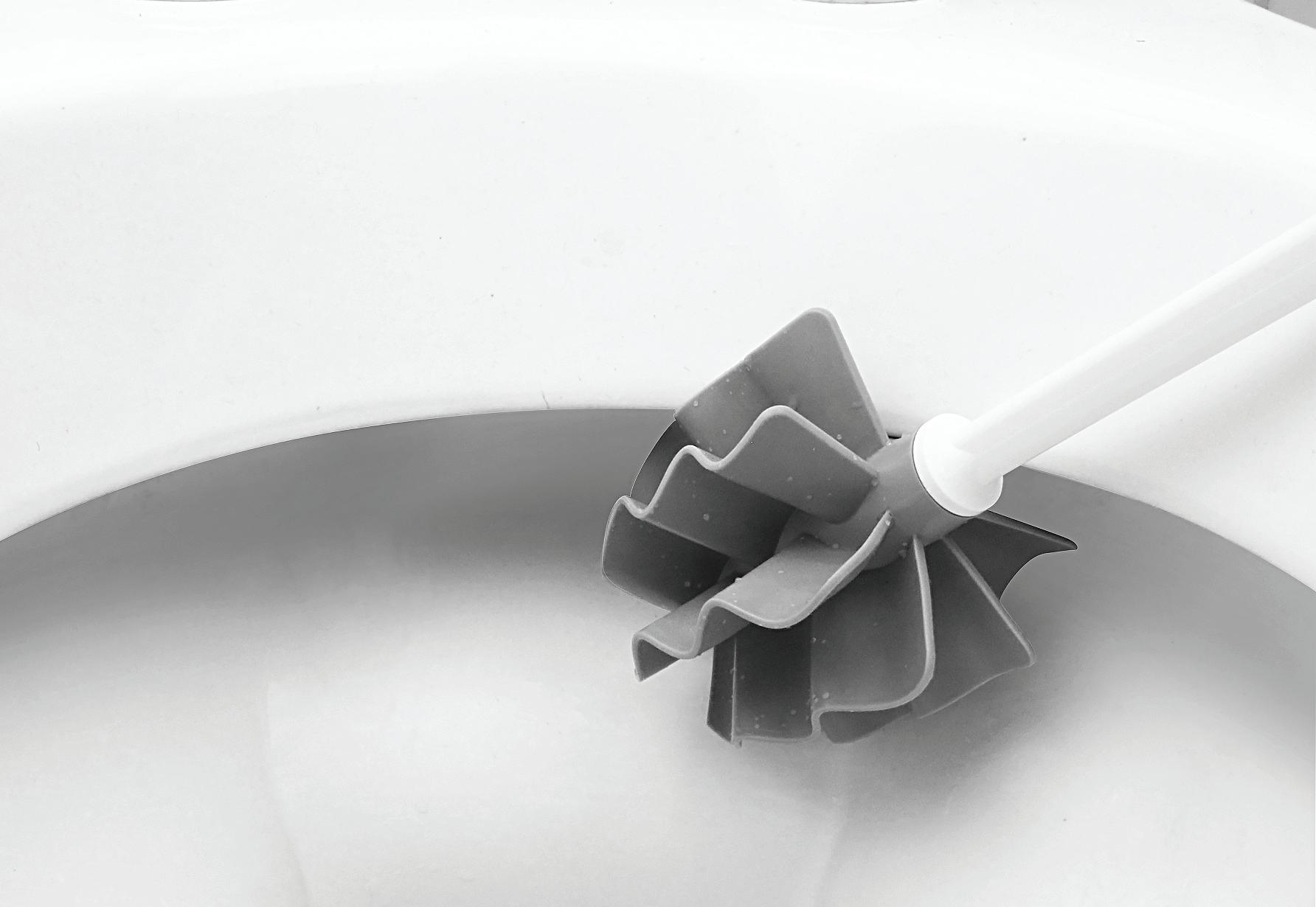
Water repellent coating
robert-scott.co.uk
The bin cleaning industry and COVID-19
Daniel Coulon, director of the National Association of Wheeled Bin Washers, reports.
IT is unlikely that anyone is going to be forgetting the Spring of 2020 in a hurry. Coronavirus has infiltrated every part of both our personal and working lives. This has certainly been felt no less by the owners and staff of the bin cleaning industry.
Government guidelines have been grey, to say the least. ‘Stay at Home’ is the message relayed to us daily and our members trying to do the right thing have been confused, to say the least. As an industry, we spend most days removing harmful germs and bacteria from customers’ bins but questions have arisen from our members including: ‘Is cleaning bins a service more important now than ever, doing our bit to help prevent the spread of the virus or inadvertently are we contributing to the spread of the virus whilst putting ourselves and staff at risk?’; ‘Are we essential, are we key workers, should we furlough our staff?’; and ‘As directors of small limited companies will we be able to claim anything like the self-employed if we do decide to close?’
The Government told us we could continue to work if we were essential, but who decides who is essential? To confuse things further this was rapidly updated to you could travel

to work if you could not work from home but what if, like most cleaning services, your business is mobile? It was clearer for industries such as construction which were told no working inside people’s properties but what if you offer a service cleaning outside properties? Our members want to do the right thing during these difficult times but at the same time wanted to have a business to go back to when this was all over.
In times like these businesses turn to their industry associations for advice. The National Association of Wheeled Bin Washers decided as most of its members are lone workers, working outside who already wear the correct PPE, they were able to continue trading as long as they adapted their procedures and cleaning practices to fall in line with social distancing. This includes the immediate suspension of all doorstep contact, encouraging online payment instead of collecting cash, and the suspension of using cloths and mops to help prevent cross-contamination. Operators are also being encouraged to work alone or to stagger start and finishing times. On top of this most companies have added to their cleaning process the spraying of industry strength germ-killing chemicals.
As we manage the peak of this virus, we as an association are confident that we made the right decision. Demand for our services - both residential wheelie bins largely for vulnerable and elderly customers as well as care homes, schools and hospitals - have increased. This is largely thanks to local councils and waste contractors advising residents and businesses to clean lids and handles of their bins to help protect waste collection operatives who come into contact with over 2000 bins a day.
To confirm our decision we were honoured recently to be invited to start conversations with the NHS which is putting a contingency plan together to provide onsite clinical waste bin cleaning at hospital sites across the UK in case there is a huge surge of clinical waste as the virus spikes and their current systems in place can’t cope with demand.
A special well done to all bin cleaning companies and other deep cleaning services who continue to make our streets cleaner and safer for the rest of us.
Stay safe!
The National Association of Wheeled Bin Washers is a member of the British Cleaning Council. The views of council members are their own.
THE OFFICIAL PARTNER OF THE CLEANING SHOW
Get the biggest read within the cleaning, hygiene and support services sector delivered to your inbox every month.
Access 12 months of past issues

Priority places on C&M webinars Invitati ons to att end Cleaning Show London and Manchester Access to regular premium content including podcasts, videos interviews and specialist reports
DIGITAL SUBSCRIPTIONS NOW AVAILABLE SIGN UP TODAY AT WWW.CLEANINGMAG.COM




Offi cial show magazine of THE
CLEANING
SHOW
Make sure you reach your target audience and adverti se with us.
For further details please contact: Michelle Andrews Sales Manager | C&M Magazine T +44 1737 855086 E michelleandrews@quartzltd.com
Join us on LinkedIn
Cleaning & Maintenance Magazine
Follow us on Twitt er
@CleaningMag
Published by
Cleaning after COVID-19 - how will it change?
Lee Andrews, CEO of DOC Cleaning, reports. AS we continue to work our way translate into better pay rates. One through COVID-19, contract cleaning thing’s for sure, the focus on employee is set to enter a new phase of wellbeing, both physical and mental, existence - on many different levels. will need to be maintained and bring On the one hand, our profile has risen with it greater attention to training to the point where we are mentioned and employee communication. And in the news and social media as a of course, it will be a real bonus if the professional service, with our staff overall demand for cleaning increases, being held up as key workers with although the economics of post an enhanced status. On the other, it COVID-19 Britain will surely lead to is clear that the way cleaning downward pressure on FM budgets is organised is going to in all sectors. change. Whilst in the On the less positive last three months side, I have concerns we have moved about how our supply on significantly in chains for products, terms of techniques equipment and PPE will employed and the react to increased levels way we manage and of demand. I also sense motivate our armies of there may be some difficult brave staff, we are now facing a discussions with customers over the new and complex challenge of how timing of cleaning shifts, in so far as to adapt to cleaning in a COVID-19 patterns of occupation in customer constrained world. buildings are changed to manage
Thinking purely about how social distancing and working from we organise work and prioritise home. Cleaning will always remain a objectives, several thoughts spring people-based occupation where staff to mind. Cleaning will be thought of have clearly-defined rights as regards less in terms of visual and more in working hours and contracts of terms of hygienic outcomes. Deep/ employment. My feeling is that kneesanitisation cleans will become jerk reactions should be avoided more important. Increased cleaning and contracts should be resumed in will be needed during the day when the same format as they were before our customers’ staff, students and buildings closed. At that point, we visitors are present. Touchpoints will then need to have the all-important need regular attention, possibly with discussions about how contracts building users being encouraged to might adapt to new demands. observe stricter hygiene protocols. That familiar acronym, CSR, is going Cleaning methodology may change, to feature in discussions more regularly. with thought given to social For many years, contractors have been distancing of our own staff. Robotic asked to demonstrate how they deal cleaning will surely evolve. A widefairly with their stakeholders - staff, ranging review of the products, tools suppliers and customers - and how and materials that form part of the they promote sustainable practice. sanitisation and disinfecting process The result is that our industry has will be required. And of course we will upped its game beyond recognition reassess how to effectively procure by introducing systems, training and and deploy PPE. workplace cultures to meet the brief.
I see positives and negatives From our new-found position as the associated with the new order. On guarantors of building hygiene in a the positive side, I sincerely hope the post COVID-19 world, we must reinforce new sense of cleaning as a service our commitment to this cause, but critical to health will not evaporate at the same time ensure that we are as buildings regain occupation. I also recognised for doing so. hope that respect for our industry will WWW.DOCCLEANING.COM


POWERFUL disinfectant, cleaner, sanitiser & deodoriser
KILLS UP TO 99.999% OF BACTERIA
Certified to EN1276 & EN13727
Fast acting—instantly deodorises
pH neutral for use on ALL surfaces including carpets & upholstery
Dilutable up to 1:5
Long lasting
Bio Productions Ltd
T: (+44)1 444 244000 | E: productions.com -sales@bio W: productions.com-www.bio
A frontline response to combatting the spread of COVID-19
Neil Nixon provides a round-up of the cleaning industry’s professional and coordinated response to the challenge posed by COVID-19.
Following on from last month’s feature looking at the essential role the cleaning sector is playing in tackling the COVID-19 pandemic, this month’s overview highlights some of the initiatives being taken by the sector’s leading businesses. The landscape relating to the pandemic changes almost daily, and the impact on our lives, our finances and, most importantly, our health and the health of loved-ones are extreme. And now we are having to come to terms with what a relaxation of lockdown rules might look like, and how the country can begin to return to ‘normal’ as quickly and safely as possible. Needless to say, the cleaning sector’s role in getting the UK back to work is paramount.
In addition to this monthly overview, I am updating the Cleaning and Maintenance website – www.cleaningmag.com – daily with latest advice, techniques, products and processes. This month, C&M also hosted a webinar entitled: ‘Reopening for business - the critical role the cleaning industry will play in getting the UK back to work’. Joining me as moderator, the panel comprised: Paul Thrupp, chairman of the British Cleaning Council and director of retail destinations at OCS; Stan Atkins, CEO of BICSc; Peter Smith, chief executive of Principle Cleaning Services; Kim Phillips, head of catering and facilities services at Rotherham Metropolitan Borough Council; Dominic Ponniah, CEO of Cleanology; and Paul Ashton, director of the Cleaning and Support Services Association and CEO of Birkin Cleaning Services. Over 600 cleaning industry professionals registered to join the webinar and a fascinating and engaging debate followed, discussing a number of the key challenges


Churchill Group has launched a COVID-19 symptom tracker app via Mo:dus, the soft service provider’s digital platform, to monitor signs and curb the spread of the Coronavirus strain that is behind the current pandemic.
Employees are encouraged to submit any symptoms on a daily basis via a simple step-by-step process. The app will then share self-isolation Government guidance. This will ensure that those showing symptoms related to COVID-19 either stay at home or seek medical support, which is an essential step in reducing the risk of transmission in the workplace and therefore a localised outbreak.
The Mo:dus symptom tracker app has been designed as a way to protect a work community by reducing the average number of people that one infected person can expect to pass the coronavirus on to, known as the R value. According to the World Health Organisation, the natural R value of coronavirus so far falls between 2 to 2.5. This means that every infected person may pass the virus on to between 2 and 2.5 other people. The worldwide ambition is to bring the R value down as far as possible, to less than 1, to prevent a second wave. This mission underpinned the development of the Mo:dus symptom tracker. The app includes an array of features, such as: • daily scheduled in-app push notifications for daily symptoms response • automated isolation prompts where applicable symptoms are logged • real-time alerts for COVID-19 cases and escalations • ability to submit key worker COVID-19 test results • in-app isolation update tracking to help colleagues and organisations better understand labour availability • trended reporting is also available on desktop.
CHURCHILL’S MO:DUS LAUNCHES SYMPTOM TRACKER
faced by the sector in getting the country back to school, back to work, and back to normal safely. If you missed it you can view it ‘on demand’ by visiting www.cleaningmag.com.
As mentioned many times previously, my association with the cleaning sector spans over two decades in one capacity or another. I have always understood the critical and outstanding role cleaning operatives play in keeping the public safe although recognition for this service has largely been ignored by the media and public at large. This, I sincerely hope, will no longer be the case and the one positive we will take from this dreadful pandemic might – once the dust has settled – be a greater appreciation of cleaning operatives and cleaning businesses. I congratulate everyone involved for a performance that is, without exaggeration, heroic.
The Mo:dus COVID-19 symptom tracker, which follows public health guidelines and is GDPR compliant, complements the NHS app already in circulation. Unlike the NHS platform, however, Churchill’s version enables data reporting via an organisational-friendly interface that has been specifically designed to help employers not only protect and reassure the workforce but also manage labour availability. This app is now available to external organisations.
Antony Law, managing director of Churchill, said: “Through our Mo:dus technology platform, we have invested significantly in our communications to frontline staff to ensure that they self-isolate if they come under risk of
contracting the virus. Our coronavirus symptom tracker app will allow our staff to self-report should they have symptoms or not. This not only prevents the spread of the virus between our teams and clients’ but it also offers people reassurance that we are doing everything in our power to protect one another.”
James Bradley, director at the Churchill Group, said: “As part of Churchill’s ongoing investment in using digital tools to enhance our clients and our colleagues’ work lives, we

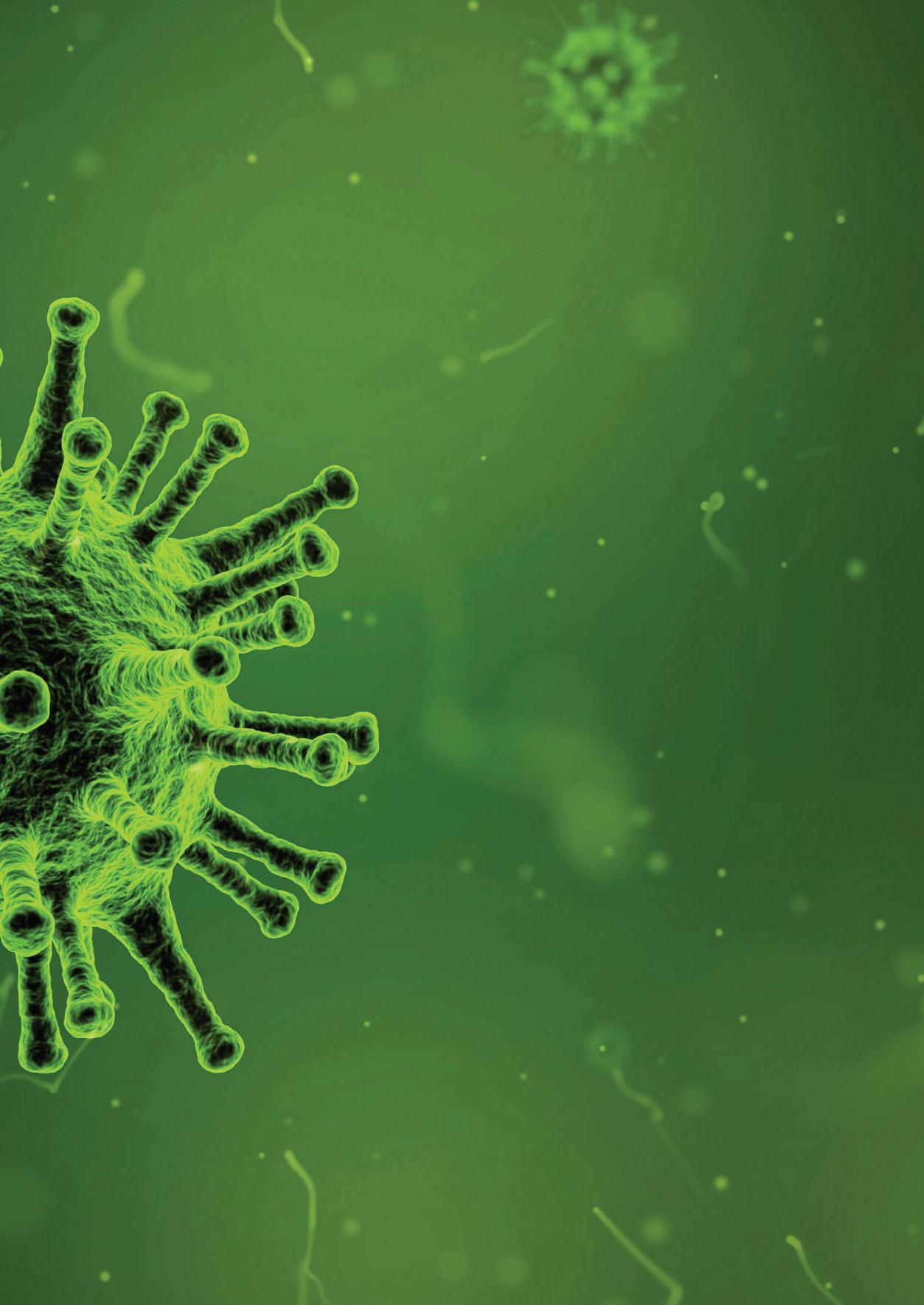
have developed a new app, part of Mo:dus. The ethos of Mo:dus is to create transparency and aid our working lives, and this new COVID-19 symptom tracker app will help everyone to protect the wellbeing of colleagues, family and friends, and support organisations’ back to work plans. Now is the time to offer employees reassurance that employers are doing everything they can to protect their teams. The app allows organisations to harness valuable data to inform the right behaviours for the good of everyone.”
In addition to the symptom tracker, Churchill’s COVID taskforce has launched a matrix of solutions designed to offer peace of mind that work environments are safe to the very highest standards. This includes enhanced a swab testing service and hygiene regimes that will, in addition to professional swabbing, proactively reduce the risk of spreading the virus when the time comes to return to the office. WWW.CHURCHILLSERVICES.COM
100% recycled material Sustainable
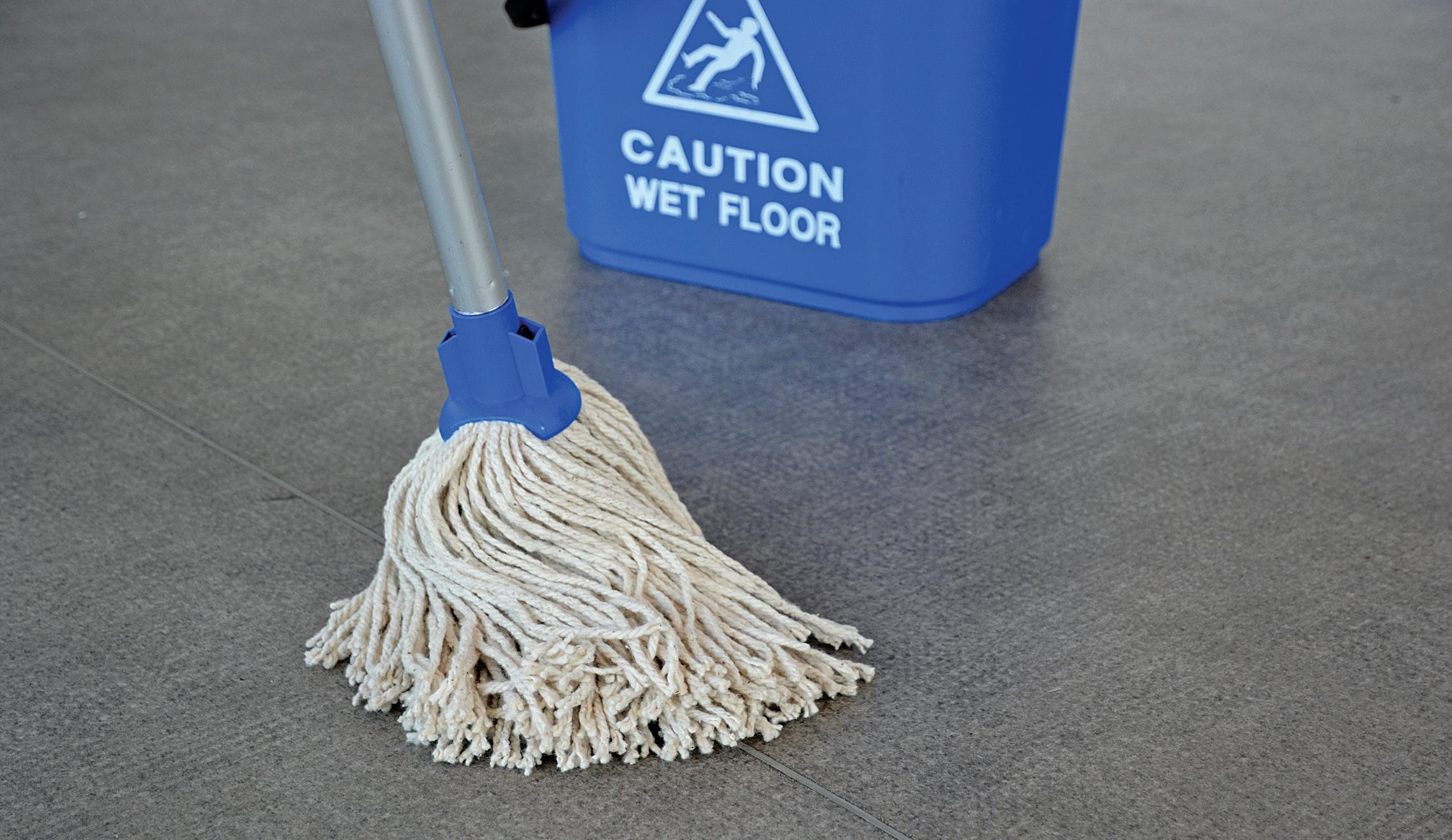
CHSA compliant
Deep cleaning and the return to work
Dale Jones, head of technical development at Alcumus SafeContractor, advises that following the Government’s announcement of the easing of lockdown measures, organisations will need to consider their H&S cleaning obligations to make their workplace safe for staff to return to.
Since the release of the COVID-19 secure guidelines, we are beginning to see more businesses come back online. The COVID-19 secure guidelines specifically set an objective to make sure that any site or location that has been closed or partially closed to be clean and ready to start. Since these guidelines were released, we have regularly been asked questions about the level of cleaning required and the specific need to undertake a deep clean before reopening.
Under the Workplace (Health, Safety and Welfare) Regulations there is legal duty to ensure that all premises and workplaces are kept sufficiently clean. Although there is no real legal definition of what constitutes a deep clean, there is reference within HSE guidance for the need for high standards of cleanliness for controlling exposure to substances hazardous to health.
The type and level of cleaning required prior to re-occupying your premises will depend on your risk assessment for your particular site and/or the activities undertaken. There are a number of things to consider: for some businesses the workplace may have been closed down for a number of weeks, so you will need to assess whether anyone has periodically gained access to the facility to undertake maintenance or security related tasks; are you aware of any of your workforce coming down with COVID-19 and had access to the facility during the lockdown period?; and, simply, when was the last time it was thoroughly cleaned?
Some businesses are seeing it as best practice to deep clean their premises, to ensure everything is as clean and safe as possible prior to bringing back the team. It is also a very visual reminder to the workforce that as a business you are taking safety seriously. If you are looking to use your own workforce to undertake the cleaning process, ensure you follow the government guidance: COVID-19: cleaning in non-healthcare settings. The guidance covers topics such as personal protective equipment, surfaces to focus on, what chemicals/ substances to use, and what to consider before placing used cleaning equipment in the waste.
Alcumus SafeContractor has over 1000 accredited cleaning contractors who have


already demonstrated that they have the relevant H&S management systems to undertake cleaning in commercial and industrial environments safely. To find out more about accessing our approved contractor portal with over 33,000 contractors, please contact: sc.clientservices@alcumusgroup.com.
For organisations currently working in accordance with government guidelines, Alcumus Sypol has created free, downloadable COSHH risk assessments which provide important information about how to effectively control exposure to Coronavirus in high risk working environments.
For organisations hoping to return to work soon and eager to learn more about safely reintroducing their people to work, Alcumus PSM has created a free ‘COVID-19 Return to Work Guidance Pack’ and two-part webinar series covering the practical application of how to get your people back to work safely and how to make your business as productive as it can be. WWW.ALCUMUSGROUP.COM
ABM helps prepare for facilities to reopen
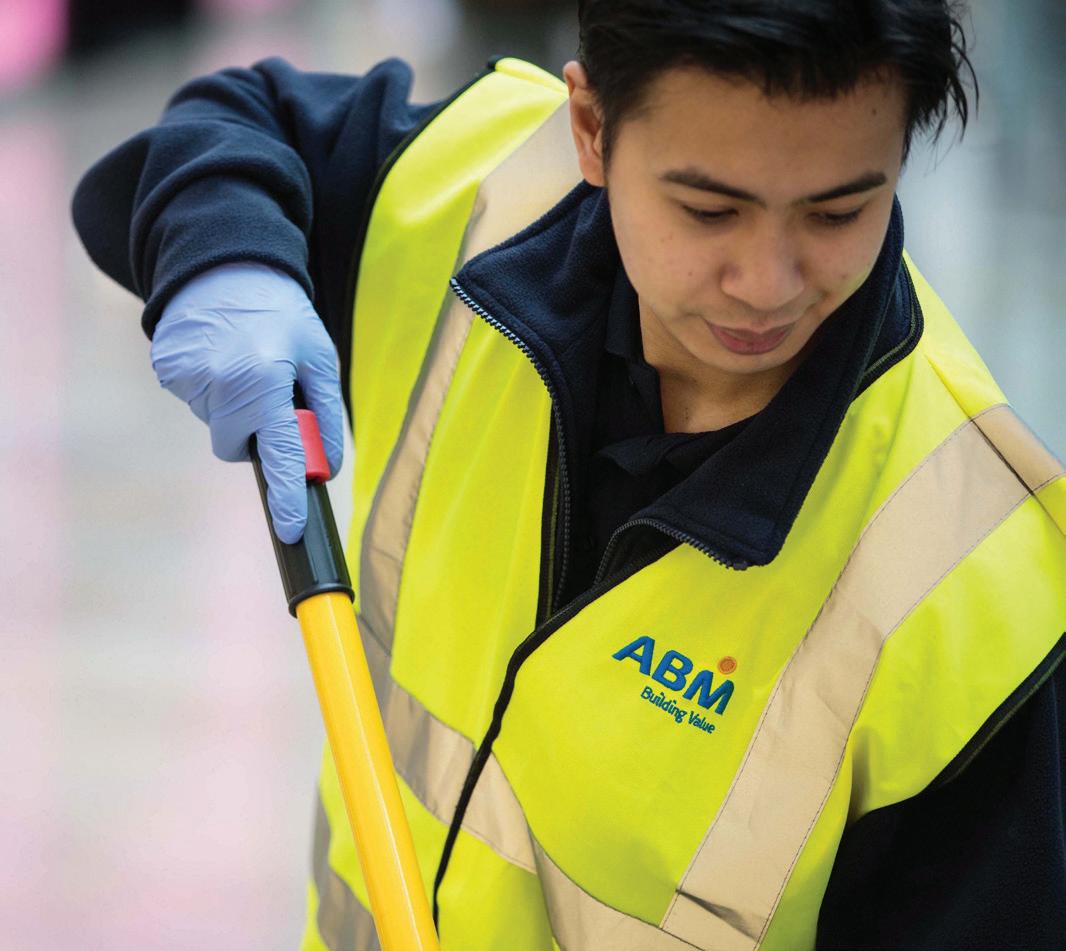
ABM UK has created a programme of services designed to help businesses reopen in the wake of the COVID-19 crisis. The three-step programme is underpinned by ABM UK’s EnhancedClean service which will help organisations provide healthier spaces, while also utilising expertise from ABM UK’s full suite of services. It will give companies the support they need to prepare and execute a safe reopening. It also considers the new normal for safely maintaining public spaces moving forward.
John McPherson, managing director at ABM UK, said: “Businesses across the globe will continue to face challenges they have never faced before as they look to reopen and recover from the impact of Coronavirus. It’s not a case of business as usual; we must all find new ways of working to keep built environments safe. From leisure facilities to office buildings, this programme includes three steps tailored to how each space is used. These will prepare sites for re-occupation and consider what facilities management operating models should look like and suggest ad-hoc procedures that can reduce the risks to people and business operation.”
Available now, ABM UK’s new programme has been built using expertise from its full suite of capabilities. Using theEnhancedClean service as the lynchpin, it also considers security, electrical and lighting, energy solutions, facilities engineering, HVAC and mechanical, data centre cleaning, and landscaping. WWW.ABM.CO.UK
Your perfect partners in hygiene

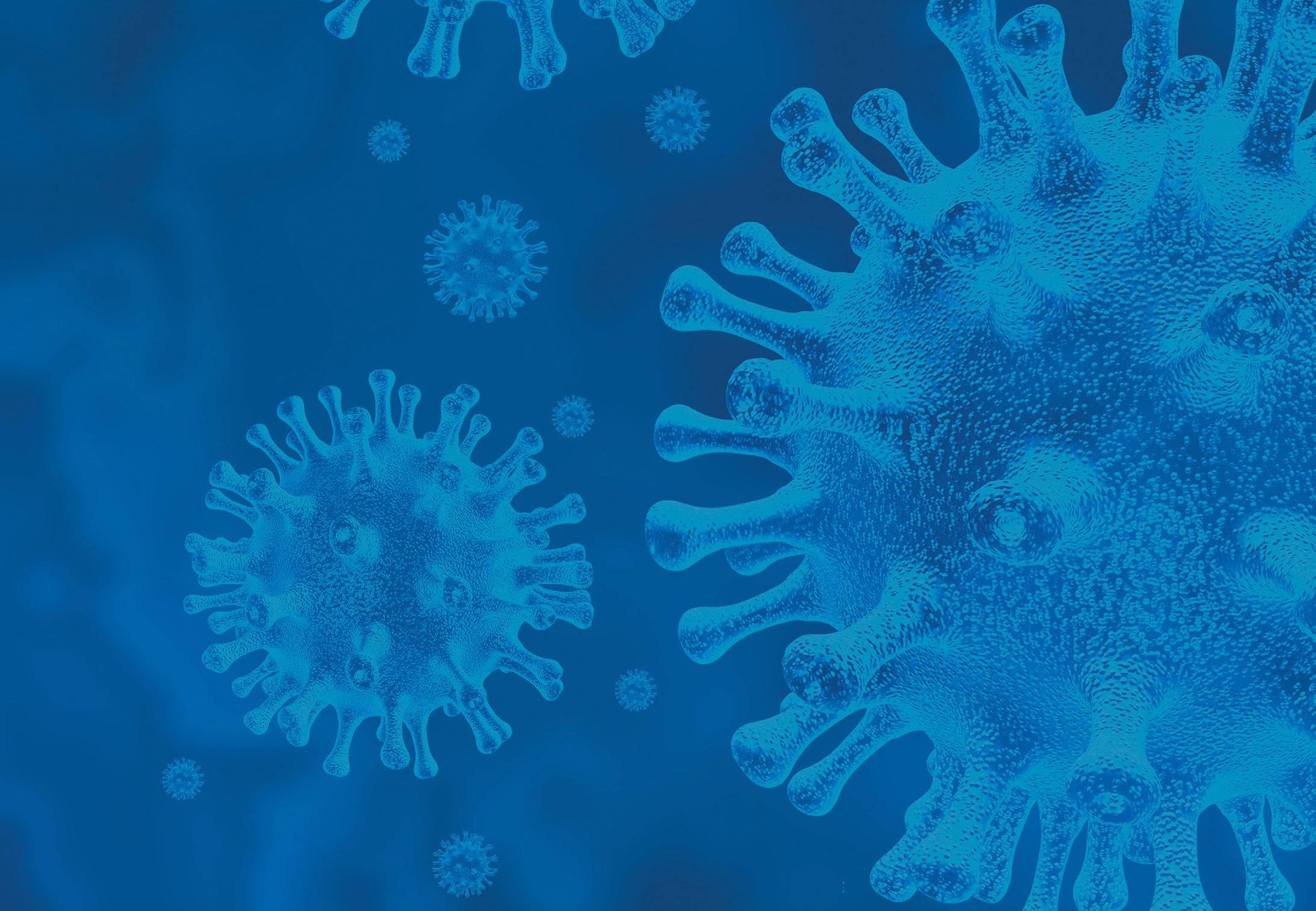
Where hygiene is essential our cleaning solutions give you the right tools for the job. From cleaning chemicals tested to EN14476 such as Microsan ® and Clensan ® , through to machines designed to give you effi cient and powerful performance such as Fivestar and Steempro Powermax. Get in touch to discover more about our professional cleaning solutions.
Effective against Coronavirus
For hard surfaces and fl oors
Use biocides safely. Always read the label and product information before use.
Effective against bacteria and viruses
For carpets and upholstery
Keeping the spread of infection at bay
Jamie Woodhall, technical and innovations manager at Rentokil Specialist Hygiene, reports.
The UK, like the rest of the world, has been turned upside down by Coronavirus. In these unprecedented circumstances, it’s more important than ever that businesses, especially those preparing to re-open, take the right measures to keep their facilities clean and employees safe - particularly once lockdown measures begin to ease.
Regular cleaning is essential
Workplaces can be prone to cross contamination due to the large number of people, shared spaces and equipment onsite. Customer hygiene expectations will likely be at an all-time high so it is essential that businesses ensure their workplaces don’t serve as a hotbed for viral infection. Kitchen, dining areas and washrooms should be subject to vigilant daily and weekly cleaning routines due to their high footfall. We advise that this regular clean is scheduled and tracked, ensuring that it takes place consistently and on time.
It might sound simple but encouraging proper handwashing, something we have heard constantly on the news in recent weeks, will also help to prevent the spread of germs. Our hands are a natural breeding ground for germs and one of the principal carriers of harmful pathogens - in fact, 80% of infections are spread by hand. Ensuring your employees have access to the essential handwashing tools - warm water, soap, drying facilities and, ideally, hand sanitiser, as well as handwashing reminders - goes a long way towards encouraging good hand hygiene practices.
Proactive prevention
On top of a regular cleaning regime, businesses should be booking a minimum of two deep cleans per year. This may need to increase depending on the nature of the business and its hours of operation, so we recommend that all businesses contact professional cleaning companies to create a bespoke service and frequency that works for them. Professional deep cleaning is also especially important during a period of illness outbreak. These cleans should be managed by a specialist cleaning company that is trained to tackle those hard-to-reach or rarely seen areas where potentially harmful micro-organisms might be hiding.
A deep clean should include a thorough disinfection of high frequency touch points, as well as moving all furniture or equipment away from the walls to make sure no areas are missed from the standard cleaning routine. One powerful tool in the deep cleaning arsenal is ultra-low volume (ULV) disinfection fogging. This involves specialist technicians generating a mist of disinfectant which settles on top of, underneath and on the sides of objects, enabling technicians to disinfect a large area in a short period of time.
With regards to the Coronavirus outbreak, businesses that remain operational would be wise to review and update their cleaning regimes. They should also consider proactively preparing in case a deep clean is required, such as in the event they have a suspected or confirmed Coronavirus diagnosis onsite. This would require a contingency survey of the premises, typically offered by experts to gather key information in advance including a site-specific risk assessment, to enable a quick response in the event of Coronavirus being reported on the site at a later date.
If there are no confirmed or suspected cases of Coronavirus on a site, an all-purpose specialist disinfection may be appropriate to help protect against microbial infection, and to help maintain a high level of hygiene in a facility.


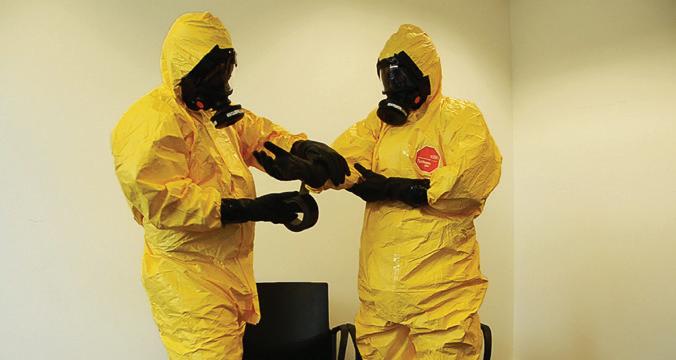
Reacting quickly
In addition to prevention, it’s also important that if a worker or visitor to your business does contract or is suspected to have

contracted Coronavirus, you react quickly to decontaminate the premises.
According to government guidance, in most circumstances the amount of infectious virus on any contaminated surface is likely to have significantly decreased after 72 hours. This is a key consideration to determine the type of specialist disinfection service that your premises will need.
For businesses with a confirmed or suspected case of Coronavirus on the premises and where the site needs to be up and running quickly, Rentokil Specialist Hygiene can implement stringently risk assessed infection control measures that go beyond the minimum World Health Organisation guidance.
Firstly, a service manager will survey the site wearing the appropriate personal protective equipment (PPE) and respiratory protective equipment (RPE). Then our team of trained technicians will meticulously, manually disinfect rooms and areas that pose a threat of causing cross contamination, using a highlevel surface disinfectant on surfaces such as floors, walls, ceilings, and any objects. ULV disinfection fogging may also be used.
All waste generated by the disinfection process needs to be segregated onsite and then disposed of in a safe and legally compliant manner, in line with guidance set out by Public Health England, to help eliminate cross contamination.
Final words
When it comes to cleaning regimes, proactivity is essential to help prevent the spread of disease, particularly during an illness outbreak such as Coronavirus. While hand hygiene will help stem cross contamination, specialist deep cleans should be considered as they offer that extra level of protection. WWW.RENTOKIL-HYGIENE.CO.UK
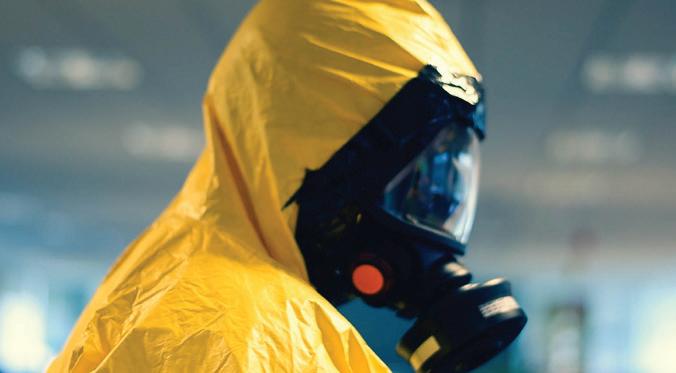
CHSA WARNS BUYERS TO BEWARE PROFITEERS
The Cleaning & Hygiene Suppliers Association (CHSA) is warning all buyers of cleaning and hygiene products to beware of unscrupulous profiteers capitalising on the unprecedented demand for these products.
New companies have been set up to buy and sell on products like hand and surface sanitisers, gloves, wipes, tissue, and aprons. Some are also buying up raw materials and attempting to produce some products. Primarily selling online, their products carry an exceptionally high mark-up and there is no guarantee they meet industry standards. There is also a marked increase in imported personal protective equipment (PPE) with fake or no CE marking, the certification mark that indicates conformance with European Union directives regarding health and safety or environmental protection.
The CHSA advises that the only way to be certain you get what you pay for is to buy from a CHSA member. All have signed the association’s rigorous Code of Practice, which requires members to be ‘well established in the cleaning

and hygiene industry and to maintain a high standard in the conduct of its business’.
The CHSA Accreditation Scheme stamp guarantees members of the Schemes for Distributors and Manufacturers of Soft Tissue, Plastic Refuse Sacks and Industrial Cotton Mops make sure ‘what’s in the box is what’s on the box’. Compliance to the CHSA’s Accreditation Schemes and Code of Practice is guaranteed by a rigorous auditing process conducted by an independent inspector. To be certain they purchase from reputable companies in these turbulent times, buyers of cleaning and hygiene products should look for the CHSA logo and CHSA Accreditation Scheme stamp.
Lorcan Mekitarian, chair of the CHSA, said: “A 10-fold increase in demand for essential products like hand sanitiser, wipes and gloves is common. Our manufacturing members are working hard to meet demand and keep product moving through the supply chain to our distributor members, but it is incredibly challenging. Some price increases are inevitable as the cost of raw materials rises but this is a long way from the extraordinary profiteering we have seen. I am proud to say our members are trading ethically. Instead of grabbing contracts at extortionate prices from desperate buyers, they are working hard to take care of their existing customers, warning of forthcoming restrictions in the supply chain and rationing where absolutely necessary.”
Demand for cleaning products like wipes, cleaning chemicals and clinical waste sacks, and for personal protective equipment including gloves and aprons, has soared. The diversion of available product to the NHS created a sharp decline in product in the standard supply chain, making it difficult for care homes, schools, businesses, and other organisations to get what they need. With these products central to creating a safe environment into which people can return to work, demand will remain exceptional for the foreseeable future. WWW.CHSA.CO.UK
The new autonomous cleaning range from ICE
AUTONOMOUS CLEANING THROUGH INNOVATION
CO-BOTICS
Brand new from ICE - a complete range of robotic cleaning equipment for any environment!
From small robotic vacuums, to scrubber dryers and sweepers of different sizes, we have an autonomous machine to work alongside your cleaning team!

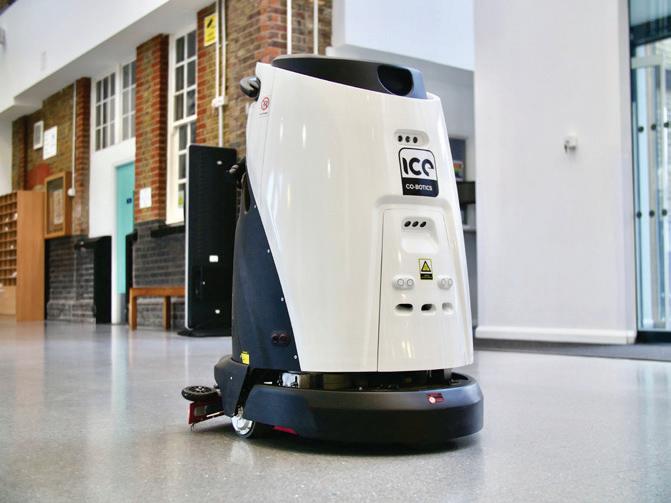
INTEGRATED TELEMETRY
WATER RECYCLING CAPABILITIES
LONG RUN TIMES & SELF-DOCK CHARGING
UNRIVALLED NAVIGATION SYSTEM





